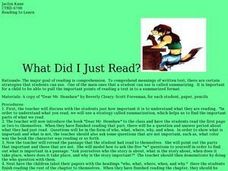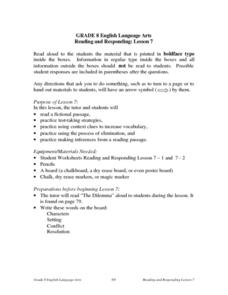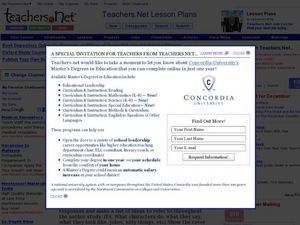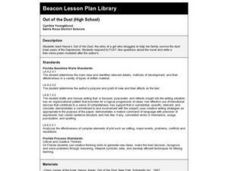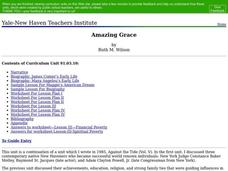Curated OER
Practice Paraphrasing
Help your high schoolers identify the main idea of a passage with this lesson on paraphrasing. First rewriting a paragraph in their own words, they then underline the most important words in their paraphrase and use them in a summary....
Curated OER
Language Arts: Creating Original Fiction
Fourth graders create fictional stories and demonstrate the use of various writing techniques. After selecting their main ideas, they find appropriate graphics to use as illustrations. In groups, 4th graders apply Hyperstudio in...
Curated OER
Author, Author!
Third graders, in groups, select and research a favorite studenT author or illustrator. They answer questions about the author, conduct research and prepare a PowerPoint presentation with their findings.
Curated OER
How an Idea Becomes a Law
Students create posters that demonstrate the step-by-step process of how ideas become laws. They list the fourteen steps of a bill becoming a law, describe a presidential veto, and define override.
Curated OER
What Did I Just Read
Fourth graders write a summary for each chapter as they read a novel. They summarize the author's purpose and point of view after completing the novel. They also describe about how the author's point of view affected the novel.
Curated OER
Reading and Responding -- Lesson 7
Fourth graders work individually or in a small group to (1) read a nonfictional selection, (2) identify main idea and details, (3) identify the author's purpose, and (4) practice test-taking strategies.
Curated OER
Because of Winn-Dixie Scrapbook
Here is a fun resource that your kids will love. While reading the book Because of Winn-Dixie, they analyze the story's main characters by creating an online scrapbook. The purpose is to have them identify character traits and use...
BrainPOP
World History Lesson Plan: Uncovering Essential Questions
Have you ever noticed a news story revolves around an essential question? Scholars research methods of reporting historical events. Working in groups, they use an interactive module to gather information on a historical topic, uncovering...
Curated OER
Topic Sentences and Transitions
High school writers identify the purpose of both a topic sentence and a transitional statement. They write a topic sentence which denotes the paragraph topic and the author's stand on that topic. Then they write an effective transitional...
Curated OER
Painters as Authors
Second graders explore artists as authors. They discuss the stories that their pictures tell. Students describe what story they think the artist is trying to tell in their pictures. Students search the Internet and choose a piece of...
Utah Education Network (UEN)
Simplifying Algebraic Expressions
Sixth and seventh graders explore the concept of simplifying algebraic expressions. They review the order of operations and apply properties to simplify and compare them. The author suggests using a "Boxes Game" as a motivator to get...
Curated OER
Creating a Science Fiction Story
As the culminating activity in a unit study of science fiction, young writers demonstrate their understanding of the genre by producing their own graphic novel. After deciding on the main elements of their story, individuals use a comic...
Curated OER
Cloze Instruction And Herringbone Technique
Students sort out important information and create a visual framework for reviewing in the future. They organize a large quantity of information thus helping with learning and remembering details, cause and effect, comparison and...
Curated OER
Robert Munsch: Author Study
Students study Robert Munsch's style of writing. In this literature lesson, students read many of Robert Munsch's books, write a list of the characteristics found in his books, and write or orally tell a story using some of these...
Curated OER
Transcendentalism and Epiphany in Ray Bradbury's Dandelion Wine
Twelfth graders examine the characteristics of transcendentalism. In this transcendentalism lesson plan, 12th graders determine what this type of writing entails before reading a passage from, Ray Bradbury's, Dandelion Wine. They cite...
National Endowment for the Humanities
"An Expression of the American Mind": Understanding the Declaration of Independence
Students research the structure of the Declaration: introduction, main political/philosophical ideas, grievances and assertion of sovereignty. They analyze the ideological/political origins of the ideas in the Declaration. Students...
Curated OER
Out of the Dust (High School)
Fourth graders read Hesse's "Out of the Dust". They respond to questions about the novel and write a free-verse poem modeled after the author's.
Curated OER
What's So Nice About Fairy Tales?
Seventh graders modernize a fairy tale, then compare their version with he original version and determine whether or not they've changed the author's original intent.
Curated OER
Amazing Grace
Students study the meaning of the term 'Jim Crow'. They examine how this term originated, when it was used, and how it served its purpose? They read two short biographies of Maya Angelou and James Comer discover that both authors...
Curated OER
Native American Legends
Second graders will engage in an in-depth study of Michigan Native American culture comparing and contrasting the culture of today with that of the past. They will also read a variety of Native American literature focusing on the story...
Curated OER
Where the Red Fern Grows: A 4th Grade Literary Focus Unit
Fourth graders explore the human and animal connection along with the idea that death is a part of the life cycle. They read "Where the Red Fern Grows." Students examine the feelings and emotions surrounding death and they discover the...
Curated OER
The Legend of the Indian Paintbrush
Third graders complete activities for the book The Legend of the Indian Paintbrush, by Tomie dePaola. In this literature lesson, the students read the story and summarize the main events. They look for story elements focusing on the...
Curated OER
Reading Comprehension
Students review the task sheet and information on SQ3R reading strategy. They choose a text for reading then apply SQ3R to the text to preview and ask questions about the content, organizational structure and author's prupose for writing.
Curated OER
Outlining
Students read and evaluate a piece of expository writing. They participate in a class discussion of the outlining process and individually outline a piece of expository writing. Finally, the students create an outline for the purpose...






